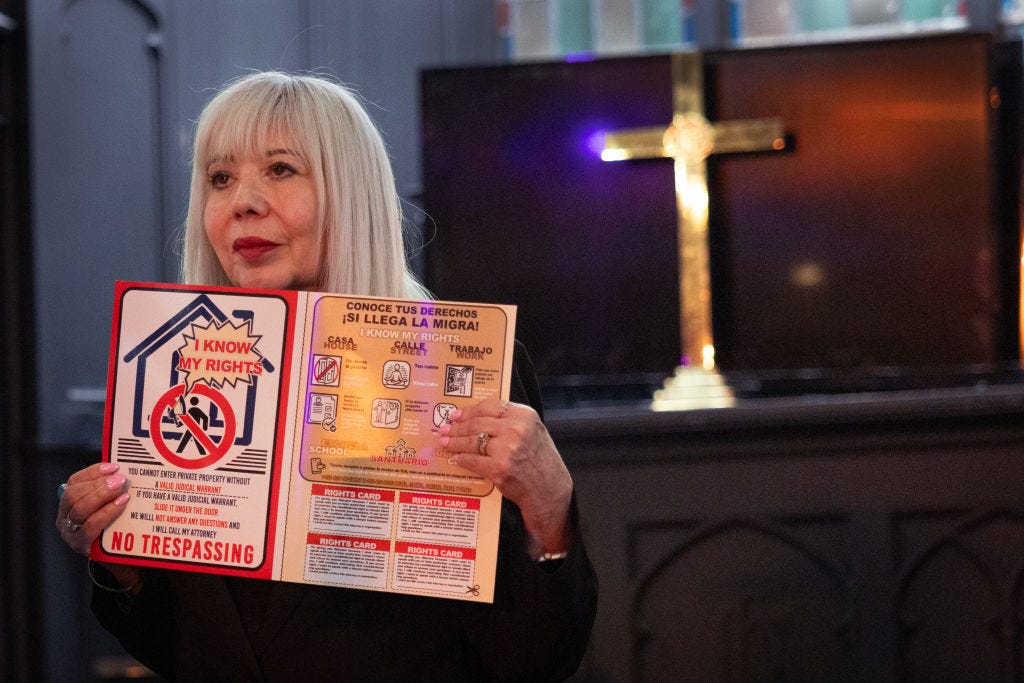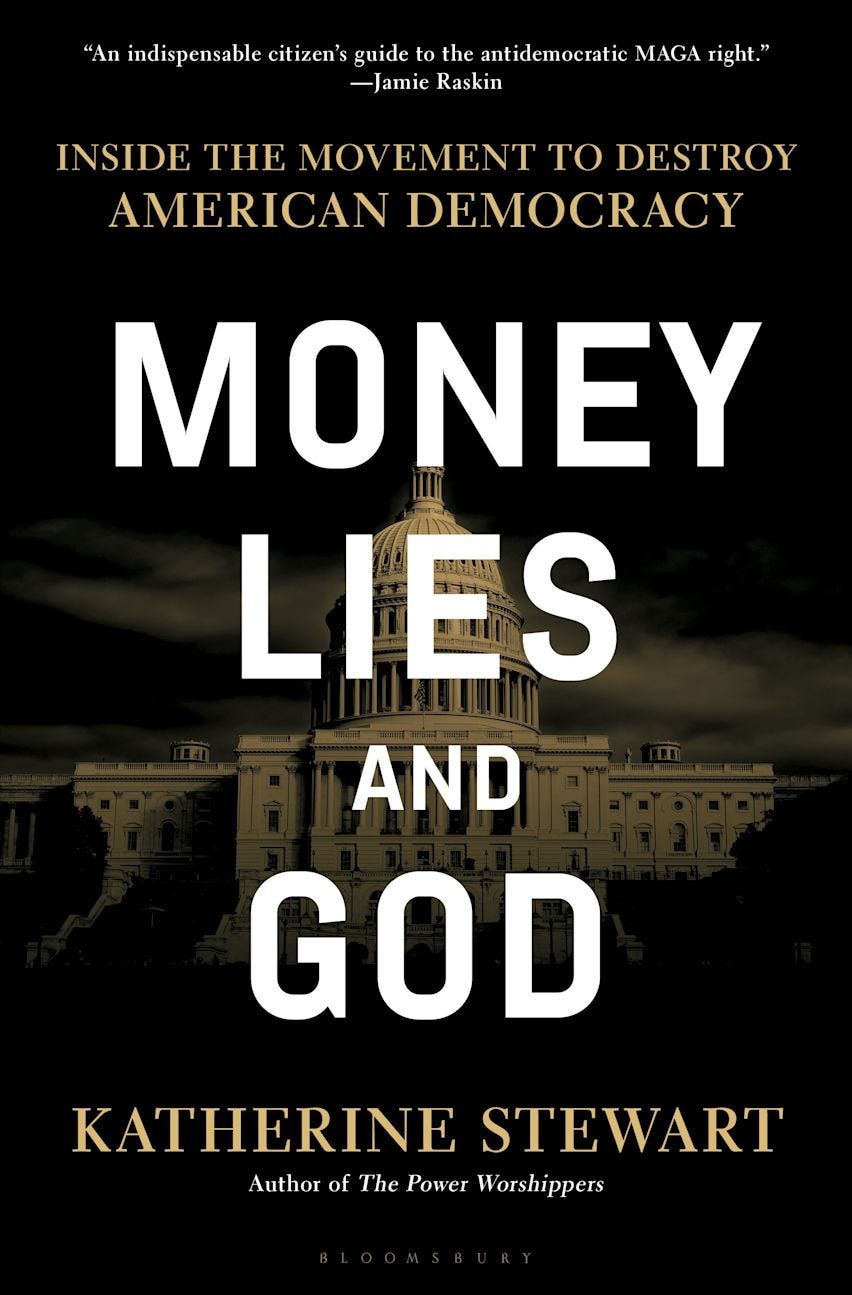Pope vs. Veep
Who is right in this dispute over immigrants? And we dig deeper into the connection between Christian nationalism and American fascism
Vice President JD Vance, fresh off arguing for the end of the Constitution’s separation of powers, has already found himself in yet another doctrinal dispute, squaring off this time with Pope Francis, the head of the Catholic Church.
Last week, Vance talked to Fox News about how his views on immigration — opposed to the teachings of Christianity as they might seem — were indeed rooted in his Catholic faith and the religion’s concept of ordo amoris, or “ordered love”:
You love your family and then you love your neighbor, and then you love your community, and then you love your fellow citizens in your own country, and then after that, you can focus [on] and prioritize the rest of the world. A lot of the far left has completely inverted that.
Vance’s vision of a hierarchy of Christian love — which one supposes justifies things like lying about Springfield’s Haitian community and building a concentration camp at Guantanamo Bay — inspired the letter Pope Francis sent on Monday to American bishops, reminding them of the Church’s clearly stated obligation to treat refugees with the same dignity they would treat anyone else — and arguing pointedly against Vance’s creative theological interpretation:
Christian love is not a concentric expansion of interests that little by little extend to other persons and groups…The true ordo amoris that must be promoted is that which we discover by meditating constantly on the parable of the “Good Samaritan” (cf. Lk 10:25-37), that is, by meditating on the love that builds a fraternity open to all, without exception.
But worrying about personal, community or national identity, apart from these considerations, easily introduces an ideological criterion that distorts social life and imposes the will of the strongest as the criterion of truth.
It’s not every day that the pope singles out a Catholic convert for a public scolding. Hillbilly Elegy, or Hell-Bully Energy?
The pope’s statement reflects a theological, moral, and political position very much opposed to the one held by Vance, and to the one that animates many American believers today (according to Pew Research, around half of American Catholics, and 67 percent of White evangelical Protestants support Trump). But it’s not all believers — there’s a tension here, if not an outright schism quite yet. Many members of American denominations and religious groups, however, feel the way Pope Francis does (and 27 of them have filed suit to block the administration's plans to carry out immigration raids in houses of worship).
Pope Francis also writes in the letter: “What is built on the basis of force, and not on the truth about the equal dignity of every human being, begins badly and will end badly.” That’s pretty clearly a warning for Vance, and for the United States — and whether we’re at the beginning or end of that story isn’t quite clear yet.
SPEAK UP: What do you think? Are our moral obligations a series of concentric circles, starting with our own people and moving outward and diluting with each successive circle? Or are we compelled to love equally across differences and borders?
How did we get here?
Investigative journalist Katherine Stewart, an analyst of the religious right, American authoritarianism, and their deep connections, has some ideas about how Christian nationalism rejected that truth and embraced the hierarchical, exclusionary vision that’s enabled the rise of Vance, Trump, and their oligarch partners in fascism.
An encounter with a benign-seeming Bible study club at her daughter’s elementary school became the basis of her 2012 book The Good News Club: The Christian Right's Stealth Assault on America's Children, and Stewart has been covering the intersection of faith and politics ever since.
Her new book, Money, Lies, and God: Inside the Movement to Destroy American Democracy, is grounded in 15 years of deep reporting on the religious right and explores the role of belief in turning Americans away from democracy and in the authoritarian political movement that’s right now consolidating power in a coup. (For a preview, read her recent New York Times op-ed.)
Anya Kamenetz talked to Stewart about the evolution of Christian nationalism, the forces of reaction that drove so many Americans to reject democracy, how oligarchs took advantage of that backlash to change to turn working people to their cause, and why, even as a fascist regime takes power, she remains hopeful about democracy in the long term.
You say the new American fascism is “more a political pathology than a political program." What does this mean? Does this mean they aren't prepared to actually govern, in your opinion? Does no one benefit from this movement? Isn’t it serving the interests of oligarchs?
Authoritarianism — or, to be less polite, fascism — is better understood as something that happens to a political system, rather than something that starts off as a full-fledged political program that receives majority support. So when I suggest that the antidemocratic movement is more pathology than program, what I mean is that it has a number of separate pieces and interest groups, sometimes working for different aims, but that nevertheless end up reinforcing one another. They are rowing in the same boat, in a sense, but the outcome of their collective actions can be unpredictable and lead to consequences that many of the rank-and-file, who are lending support to the effort, neither anticipate nor want.
To your point about the oligarchs, yes, they are one faction and they are pursuing what they believe to be in their interests. In the short term, many loyalist oligarchs will be rewarded with policies that are beneficial to their pocketbooks. But we should keep two points in mind: First, these oligarchs depend on the support of a huge part of the population that will not benefit from their initiatives and, if they understood properly what was going on, wouldn’t support it. And secondly, these oligarchs are not nearly as smart as they think they are. By investing in the corruption and dismantling of democracy, they may get some short-term payouts – but in the long run are making life worse for themselves or their children or grandchildren, if they have any.
A good example of the pathological aspect of the movement is its incredibly performative nature. A disproportionate number of the initiatives or issues that draw its attention have almost nothing to do with constructive policy, and everything to do with performance – with dominance displays, the ritual punishment of political enemies, the scapegoating of targets, the acting out of grievances or resentments. These are examples of behaviors that are not goal-directed, but reactive.








